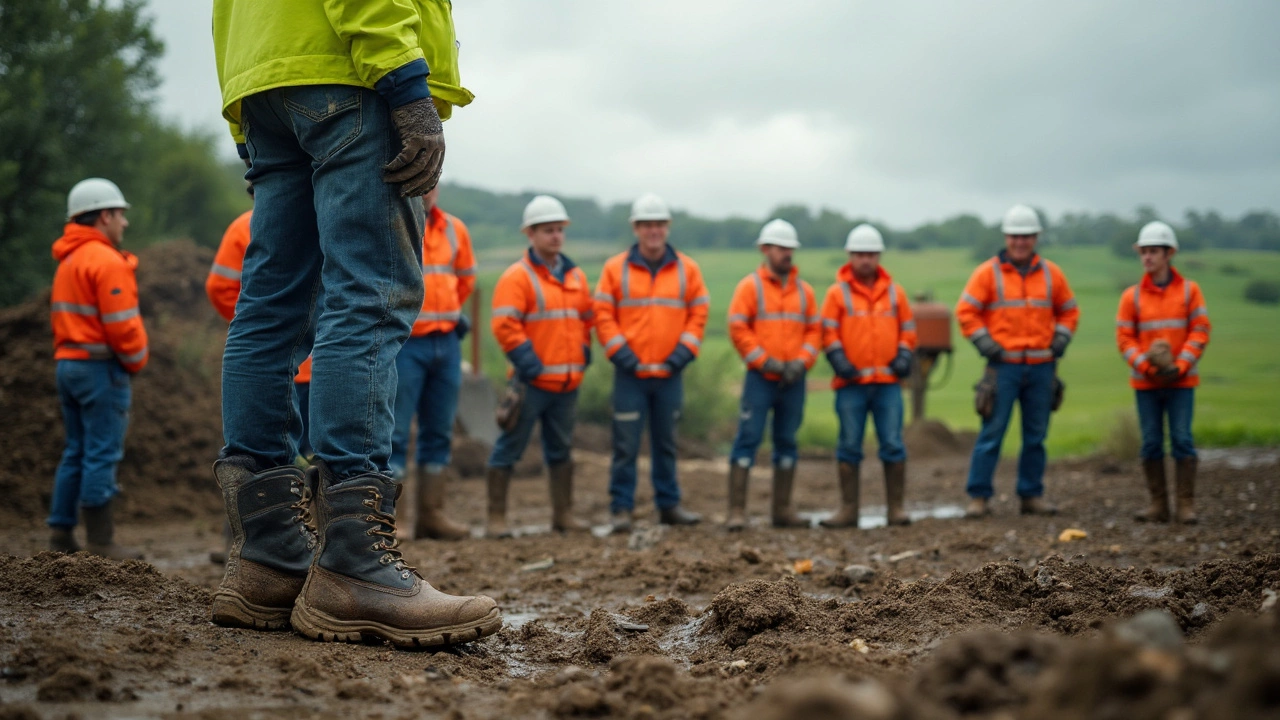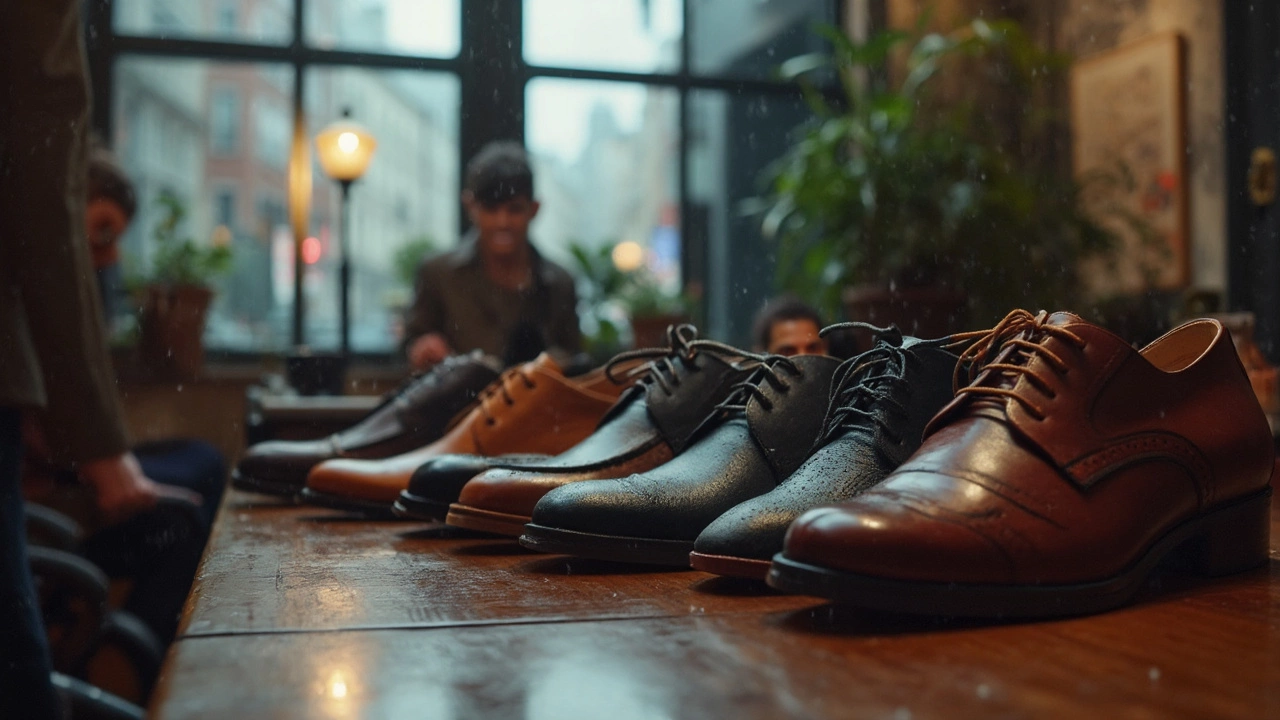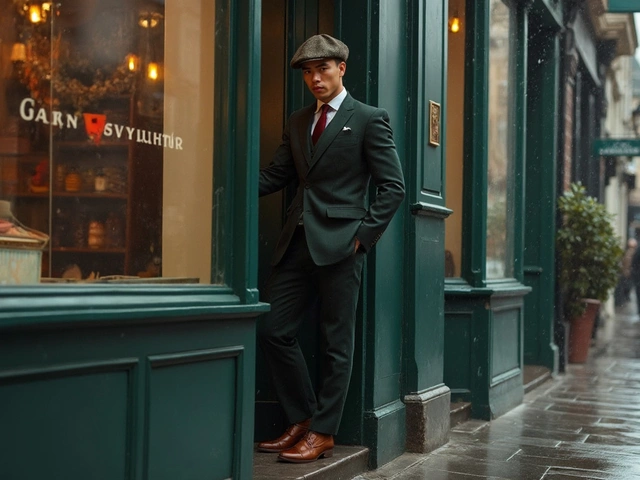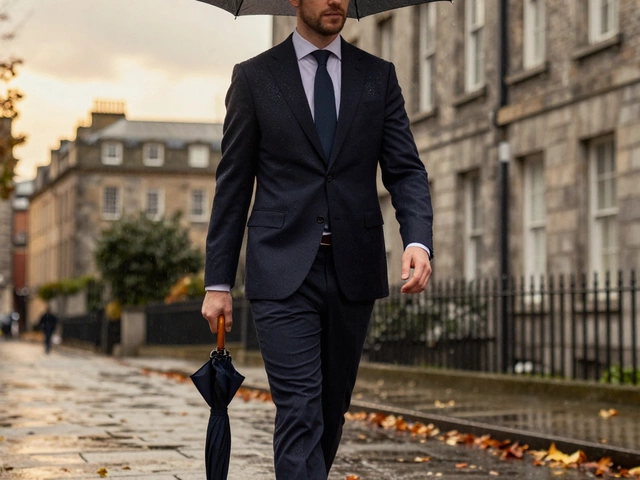Figuring out what shoes are allowed at work in Ireland isn’t as simple as it sounds. One job lets you wear trainers all week, another insists on polished brogues or sturdy safety boots. You might walk into a company in Dublin’s Docklands and see everyone in runners and jeans, but step into a Cork law firm—totally different story.
If you’re about to start a job in Ireland or switching careers, don’t gamble on what’s “good enough.” Irish employers can be sticklers for shoes—after all, we’ve got surprise rain one minute, client meetings the next, and half the country walking to the Luas. The rulebook is different for every sector: think black leather flats for the bank, steel-toe boots in construction, or non-slip trainers in a Galway café.
Your best bet? Ask HR for a dress code or check the staff handbook. But don’t just stop there—think comfort, grip for wet footpaths, and longevity too. Shoes that last in Irish weather and suit your workplace look are worth every euro. If you’re not sure, stick with neutral colours like black, navy, or brown. They’ll take you almost anywhere, from city offices to rural schools—and keep you off the manager’s radar. Still have doubts? The next sections will walk you through specific rules and handy spots to shop around Ireland.
- What Does the Workplace Really Expect?
- Irish Traditions and Modern Dress Codes
- Safety Rules for Specific Jobs
- Comfort and Weather—A Uniquely Irish Challenge
- Where to Shop for Work Shoes in Ireland
- Real-Life Tips: Balancing Rules and Style
What Does the Workplace Really Expect?
You’d think there’s a clear set of rules for work shoes Ireland, but workplaces across the country have their own take on what’s right. One size definitely doesn’t fit all. In Dublin, especially inside tech companies or creative agencies, anything from clean trainers to smart leather boots goes, as long as they look tidy. Over in banking, insurance, or government jobs, you’ll spot polished oxfords, loafers, or low-heeled court shoes more than runners.
It’s not just about fashion—it’s often company policy. Irish employers are getting more direct about footwear in their dress codes. A 2024 survey by Ireland’s CIPD branch found that 64% of companies with a formal dress code clearly mention shoes as a requirement, either by style or by colour. Schools, hotels, and food businesses tend to be even stricter for hygiene reasons.
“The first thing people notice about your workwear—apart from a smile—is your shoes. No one wants to hand over their keys or handshake to someone in muddy trainers or flip-flops.”
—Mary O’Grady, HR manager at a large Irish accounting firm
You’re most likely dealing with one of these expectations:
- Smart and Traditional: Leather lace-ups or closed-toe flats, especially in offices, banks, and government buildings.
- Business Casual: Plain loafers or neat trainers often make the cut, mostly in tech, start-ups, or education.
- Strictly Practical: Safety boots on building sites, anti-slip trainers in kitchens, comfy clogs or uniform shoes in healthcare.
Dublin Bus, for example, actually lists "plain, sturdy black shoes" on its driver dress code, and most high street banks stick to "dark, closed-toe, polishable shoes." You won’t see flip-flops, sandals, or anything open-toed unless you’re working from home.
Here’s a quick look at what’s common across some major Irish sectors:
| Sector | Common Shoe Type | Notes |
|---|---|---|
| Offices | Leather, loafter, oxford, low-heel | Usually black or brown |
| Construction | Steel-toe boots | Mandatory for insurance and safety |
| Hospitality | Black non-slip trainers/shoes | Closed-toe required |
| Healthcare | Clogs, waterproof, easy-clean | No fabric shoes allowed |
| Retail | Comfortable, presentable flats or trainers | Usually no bright colours |
Best tip? If you’re unsure, send a quick email to HR or ask your manager before you spend money. Sometimes it’s as simple as sticking with what you saw at the interview or on your first team Zoom call. It’s way easier than getting caught out on day one and having to dash to Arnotts or Marks & Spencer for an emergency pair during lunch.
Irish Traditions and Modern Dress Codes
The rules about work shoes Ireland style aren’t just old-fashioned ideas passed down by stubborn bosses. In Ireland, we mix a bit of tradition with today’s trends, and the end result really depends on where you work and who’s in charge. For decades, the basic black shoe—think loafers for men, leather pumps for women—ruled most offices, schools, and even the halls of the Oireachtas. Old habits die hard, especially in banks, legal firms, and government buildings, but things are changing fast.
Thanks to Dublin’s growing tech scene, places like Google and Facebook in Grand Canal Dock made casual trainers and colourful kicks totally normal at the office. But, show up with those same shoes at a Clonmel hotel lobby or a Galway school, and you’ll probably get a raised eyebrow from your manager (or your mam, if she hears about it!).
Here’s how it usually breaks down in Ireland’s workplaces:
- Formal settings (law firms, banks, council offices): Stick to black or brown leather shoes with a closed toe. No sandals or flashy colours.
- Business casual (tech companies, marketing, startups): Clean trainers, loafers, or ankle boots are fine—nothing too sporty or worn out.
- Retail and hospitality: Closed, non-slip shoes—black is safest. You’ll see brogues, flats, slip-resistant lace-ups, and no heels over a few centimetres.
- Healthcare and education: Comfort comes first. Clogs or sturdy trainers, always closed-toe. Hospitals in Ireland ban open backs for hygiene and safety.
Fun fact: An IrishJobs.ie survey in 2024 found that over 70% of Irish companies now say runners or trainers are okay for ‘casual Fridays.’ But Mondays to Thursdays, old-school rules usually apply.
| Sector | Usual Shoe Expectation | Exceptions? |
|---|---|---|
| Finance & Law | Polished leather, neutral | None |
| Tech & Start-ups | Clean trainers, boots, flats | Sandals still tricky |
| Hospitality | Black, non-slip, closed-toe | Heels discouraged |
| Healthcare | Sturdy trainers, clogs | No open backs |
| Retail | Black flats, slip-resistant | Fashion trainers for sporty shops |
If you’re ever in doubt, look around at your colleagues’ feet on your first day. Irish people aren’t shy about letting you know if you’ve missed a trick when it comes to dress codes, especially shoes. Safe bet: always go for comfort, weather-proof options, and neutral colours until you know the local vibe. The craic won’t be worth the blisters or a telling off from the boss.
Safety Rules for Specific Jobs
If you work in Ireland, safety rules for shoes are strict in many jobs—especially where accidents could happen. Construction, healthcare, kitchens, and even warehouses all have their own non-negotiable rules. Skip the rules and you'll risk warnings, being sent home, or even injury.
On Irish building sites, it’s the law: you need steel-toe boots, rated EN ISO 20345 or higher. Think brands like CAT, Dunlop, or the trusty Amblers that are sold everywhere from Screwfix to local shops around Limerick and Galway. Why? These boots protect you from dropped tools, heavy loads, and sharp objects. Some sites also want midsole protection (for nails), and slip-resistant soles—Dublin weather and muddy ground don’t mix well otherwise!
If you’re in catering or hospitality, non-slip soles are king. Floors get wet and greasy fast—no one wants a fall carrying pints in a packed Temple Bar on Saturday night. Shoes need to be closed-toe, easy to clean, and comfy for long shifts. Loads of kitchens—like those in SuperValu delis and Centra stores—actually check your footwear before you start. Some even give a list of approved brands, like Skechers Work or Shoes for Crews, which you’ll find in Arnotts or online.
Healthcare staff—nurses, carers, cleaners—have rules too. The HSE says footwear must be flat, supportive, non-slip, and have closed heels and toes. Crocs are sometimes allowed, but only if they’re the backed, work-safe kind (and you won’t see them in theatres, where anti-static or waterproof shoes are a must). Comfort and hygiene are just as important as safety, because shifts can easily hit 12 hours.
Here’s a quick look at the main requirements for different workplaces:
| Job Type | Main Shoe Requirement | Example Brand/Standard |
|---|---|---|
| Construction | Steel-toe, slip-resistant, EN ISO 20345 | Caterpillar, Amblers Safety |
| Hospitality | Non-slip, closed-toe, wipe-clean | Skechers Work, Shoes for Crews |
| Healthcare | Flat, supportive, non-slip, closed heel/toe | Oxypas, Hush Puppies |
| Warehouse/Logistics | Steel-toe, anti-static, water-resistant | Dewalt, Dr. Martens Work |
| Office | Formal, comfortable, neat | Clarks, Ecco |
Don’t try to get around these rules. Your employer is legally obliged to check you’re in proper shoes—and the Workplace Relations Commission inspects safety kit on random visits. If you’re unsure, ask your supervisor, or check the employee handbook. When in doubt, buy from an Irish shop that offers free returns, like Intersport Elverys or Pamela Scott—you don't want to be stuck with €90 boots that aren’t allowed on site.
One last tip: always break in new work shoes before your first shift. Even the best work shoes Ireland shops can't promise zero blisters on day one. Wear them around the house, thick socks and all. Your feet will be grateful by Friday.

Comfort and Weather—A Uniquely Irish Challenge
Anyone who’s spent a week in Ireland knows you can get all four seasons in one day. That means picking the right work shoes Ireland style isn’t just for show—it’s about surviving surprise showers, blustery wind, and puddles big enough for ducks. And with a lot of us walking or using public transport, sore feet after a long day is a common complaint.
Comfort starts with the basics: don’t buy shoes that only look smart but leave your feet aching by lunchtime. For office jobs, go for leather or good-quality faux leather. They let your feet breathe (important in a humid climate) and don’t stay soggy after a rain dash to SuperValu. Avoid cheap soles—Dublin’s wet pavements will have you slipping in front of the whole street.
Up north, where weather’s that bit colder, lined insoles or thermal socks are handy from November to March. Down south, rain is a year-round guest, so waterproof or water-resistant shoes make sense even if you’re working in retail or hospitality. A lot of shop floors in Galway or Limerick have slippy tiles, so non-slip outsoles can save you a nasty tumble.
Here are a few practical tips locals swear by:
- Go a half size up if you’ll be wearing thicker socks in winter.
- Choose darker colours—mud and water stains show less.
- Pick shoes with sturdy grips for extra safety on wet or cobbled streets.
- Keep a spare pair of dry socks in your bag or drawer. You’ll need them.
Big Irish chains like Clarks, Ecco, and O’Flynn’s in Cork all offer weather-friendly work shoes. There’s no shame in prioritising comfort—no one in Ireland ever got a bonus for having blisters. The right pair lets you focus on the job, not your feet.
Where to Shop for Work Shoes in Ireland
No matter if you’re hunting for sharp office loafers in Dublin or non-slip kitchen shoes in Limerick, you’ll find plenty of options in Ireland—just not always where you’d expect. Some of the bigger cities have stores with wide selections for just about every job. Clarks, Ecco, and Skechers are stocked across high streets in Galway, Waterford, and Dublin, and they’re reliable for comfy business-casual picks or those on their feet all day.
For tough jobs, like warehouse work or construction, your best bet is places like Arco Safety, Safety Direct, or Screwfix. These are dotted around bigger towns and also offer next-day delivery online if you’re stuck in a rural area. They stock proper steel toe boots and other certified footwear that meets Irish and EU safety requirements. Even Lidl or Aldi sometimes do special buys on work boots and trainers that are surprisingly decent for the price.
If you’re in retail, healthcare, or hospitality, you’ll find shoes made for long shifts—from Clarks’ cushioned flats to the practical ranges at Dunnes Stores and Marks & Spencer. For smaller feet, check out Elverys (they’re not just for runners), or the wider-fit options at Shoe Rack and Ireland’s famous Carl Scarpa.
- For bargains and a mix of smart shoes or trainers, try Shoe Lane in Dublin or Shoe Rack outlets in the bigger towns.
- Need something fast? Arnotts, Brown Thomas, and Shaws usually keep the classics in stock and often run in-store discounts for workwear.
- Online? The Irish site ShoeSuite.ie delivers quality picks nationwide with easy returns—handy if you’re stuck for time or live outside a main hub.
Whatever your job, always try shoes on late in the day (feet tend to swell) and check the returns policy; work shoes get a lot of use and you’ll want to swap them out quick if they pinch. And if your workplace provides a uniform or has a uniform allowance, keep your receipts—you could save a chunk or reclaim the cost on your tax. When it comes to work shoes Ireland can actually offer more choice than you’d think, once you know where to look.
Real-Life Tips: Balancing Rules and Style
So, you’ve got to follow the dress code, but you’d rather not spend the day limping in stiff shoes or looking like you just left a PE class. People across Ireland want shoes that won’t get them in trouble yet still feel like themselves—especially with our knack for trekking between bus stops, dodging puddles, and squeezing in a lunch stroll along the Liffey or around Eyre Square.
If you work somewhere with strict rules—say, a pharmacy chain like Boots, or a corporate office on Hatch Street—here’s how to play it smart:
- If the dress code says “formal,” look for shoes with cushioned insoles. Brands like Clark’s or Ecco (both with Irish outlets) offer sharp styles but don’t wreck your feet by 5pm.
- For retail and hospitality, non-slip soles are non-negotiable. Irish workplaces see up to 8,000 slips and falls every year, according to the Health and Safety Authority. That’s more common than you’d think, so non-slip trainers or brogues are a must.
- Trainers are now common in tech, start-ups, and even marketing firms in Dublin and Galway. Just keep them tidy—and avoid flashy colours unless you know your workplace is up for it.
- Bring backup shoes if possible. Irish weather loves a twist, and there’s no shame in swapping out soggy flats for clean loafers at the office door.
- Ask colleagues what actually happens in your workplace. Dress codes can be strict on paper, but sometimes everyone wears what’s comfortable, especially in smaller Irish businesses.
- If you’re on a budget, shop off-season or in places like Shoe Zone, Penneys, or local markets—especially during back-to-school sales, when you’ll find surprisingly sturdy work shoes Ireland needs for all ages.
Want to weigh comfort vs. formality? Here’s a breakdown of what Irish workers value most, based on a 2023 LinkedIn Ireland workplace survey:
| Shoe Feature | % of Workers Prioritising |
|---|---|
| Comfort | 61% |
| Weather-Proofing | 20% |
| Smart Appearance | 14% |
| Brand/Style | 5% |
So, most people care less about a brand and more about getting through the day blister-free and not landing on their backsides in a puddle. If you want to toe the line (sorry, couldn’t resist), just pick shoes that fit your company’s look, handle the Irish weather, and let you get around safely and comfortably. No need to ditch your own style—just steer it towards practical choices that suit your everyday grind.





